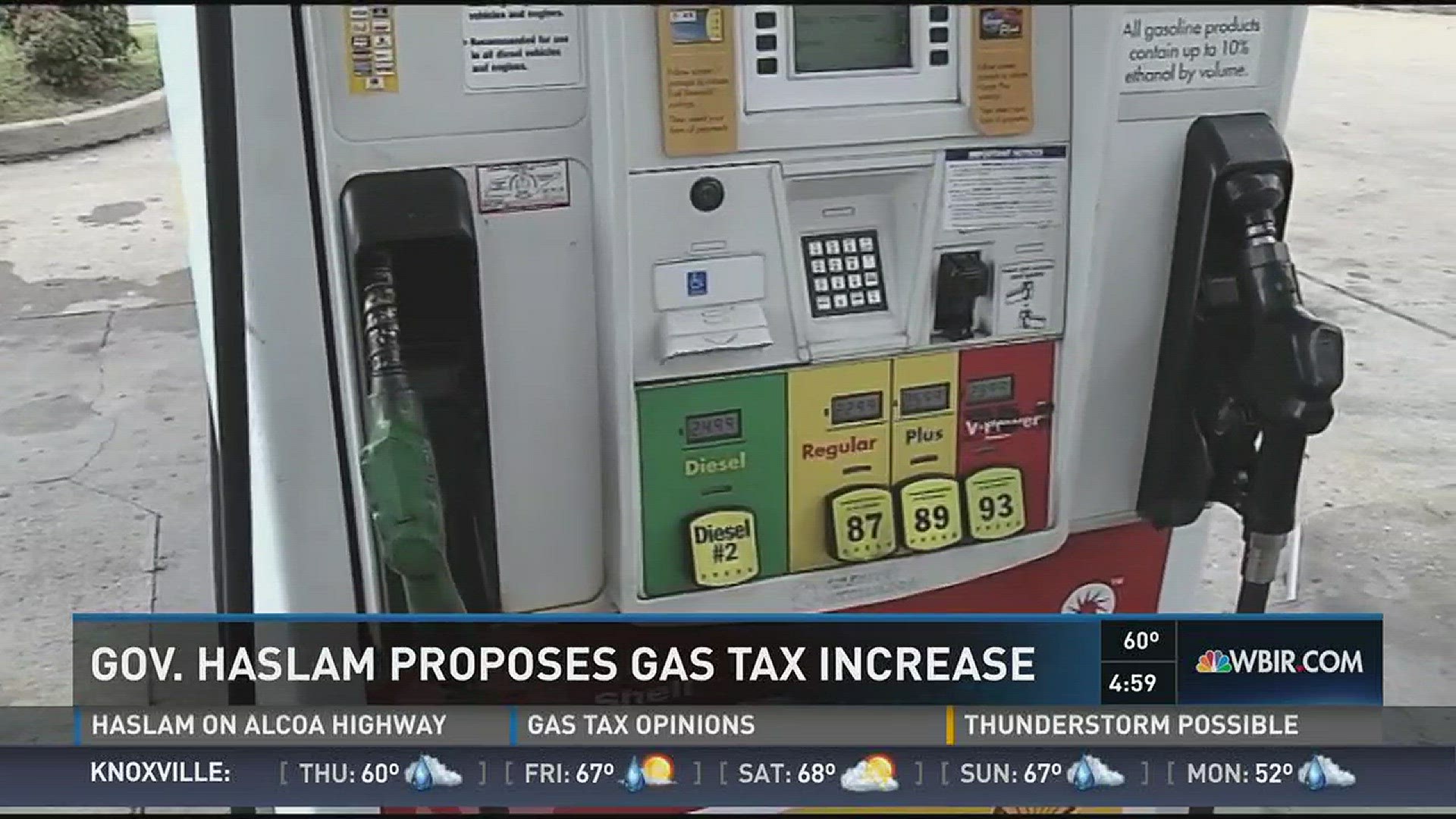Gov. Bill Haslam is pushing a 7-cent hike in the state's gas tax, new fees on electric vehicles and rental cars and an end to being able to have an open container of alcohol in a car as part of an overall package aimed at tackling a $10-billion backlog of road projects that have been waiting for funding.
The plan, which is officially known as the Improving Manufacturing, Public Roads and Opportunities for a Vibrant Economy or IMPROVE ACT, also calls for slashing the state's sales tax on groceries by another half percent, $113 million in cuts to the state's business taxes, as well making additional cuts to the Hall Income Tax.
Flanked by mayors from across Tennessee, Haslam unveiled his plan on Wednesday, which calls for the first gas tax increase since 1989.
The Plan
Under Haslam's proposed plan, Tennesseans would begin to pay an additional 7 cents per gallon on gasoline and 12-cents per gallon on diesel beginning in July.
The dual gas tax increases would net the state's Department of Transportation an additional $227.8 million, with cities receiving about $39 million and counties another $78 million.
Cities and counties would be able to use that money to fund local transportation projects.
The plan also would allow municipalities to hold referendums to decide whether to impose a surcharge on their sales tax rates that would be used to fund public transit projects.
One of the more intriguing changes in Haslam's plan involves changing the state’s open container law. Tennessee is one of just a few states that allow passengers to have an open container of alcohol if the driver is not drinking. Haslam said the current law prevents the state from using $18 million in federal money annually on road projects, or about the equivalent to one cent of increase on the gas tax, he said.
The plan will also index the gas tax to the Consumer Price Index, meaning the rate will fluctuate with inflation. Currently, Tennessee’s gas tax is a flat rate and has not increased for nearly three decades. Haslam said the current tax equates to be worth about 11 cents per gallon currently. The grocery tax is already indexed, similar to other state taxes.
Other changes that Tennesseans will see under Haslam's proposed plan include an increase in vehicle registration fees. The average passenger vehicle would have its registration go up by $5, according to Haslam.
The plan also calls for a new $100 fee paid for by anyone who owns an electric vehicle in Tennessee, as well as an increase in the charges for using alternative vehicles.
The IMPROVE Act also calls for a 3 percent charge on all rental cars.
The overall changes would result in $278 million in new dollars that could be used to fund more than 960 transportation projects that are planned across the state's 95 counties.
Tax Cuts
Perhaps as part of the effort to sell the plan to lawmakers, Haslam has included several tax cuts in the IMPROVE Act.
They include cuts to the state's franchise and excise tax. The franchise and excise taxes, though referred to collectively, are separate taxes paid by businesses annually. The franchise tax is paid on real property owned or used by businesses and the excise tax is paid on earnings.
In a morning meeting with reporters, Haslam cited a University of Tennessee study that found Tennessee has the third highest business taxes in the country.
Beyond the business tax cuts, Haslam's plan seeks to reduce the state's grocery sales tax rate to 4.5 percent, down a half-percentage point. That would result in a $55 million revenue reduction for the state and would bring the total grocery sales tax cuts to $101 million since the governor entered office in 2011, according to Haslam.
The final tax cut Haslam is proposing as part of the IMPROVE Act relates to the Hall Income Tax, the tax on earnings from dividends and interest.
Haslam said last year's legislation to phase out the Hall tax required it to be gone by 2022. Under his new plan, Haslam is proposing cutting it an additional 1.5 percentage points this year, with a commitment to cut it an additional 1.5 percentage points next year. Those cuts would result in $102 million in tax cuts, according to Haslam.
The pitch to lawmakers
Haslam needs to sell 132 lawmakers on his plan, especially given the state's nearly $2 billion budget surplus in recurring and nonrecurring money.
Prior to his press conference, Haslam laid out three aspects as part of his pitch to lawmakers.
First, he said, the use of the state's one-time surplus money would not be a good move. "It's paying your mortgage out of your savings' account," he said. "Not a good idea."
Haslam also said the state's general revenue fund is mostly paid for by Tennesseans. The difference is that the state's transportation fund is paid for by people who use the state's roads, which includes people who live outside Tennessee.
"I don't understand why we want Tennesseans to pay for roads that everybody uses," he said.
Haslam also said the way the transportation fund works right now, a certain percentage goes to cities and counties. By taking money out of the state's general fund to pay for transportation needs, that doesn't take into account the needs of the cities and counties.

